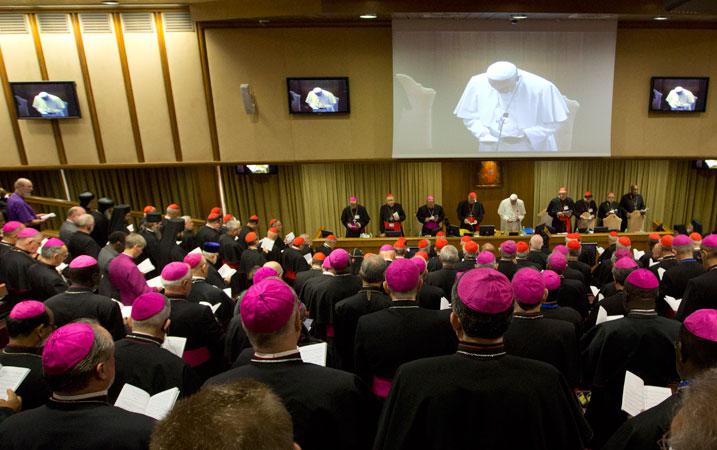|
Synod Notebook: On Day One, a debate about process and taking things off the table
By John L. Allen Jr.
ROME – As the 2015 Synod of Bishops gets underway, two things seem clear. One is that many prelates seem determined to stay positive as much as possible, playing down their differences and trying to shift the discussion away from controversial matters toward areas of potential common ground. The other is that real tensions over issues, as well as the synod process, may make that goal awfully hard to achieve. On Monday, the real work of the synod began when the opening speeches finished and the live video feed was turned off, allowing bishops to begin delivering their own brief talks to one another. There was an early round of remarks which, under new rules, had to be kept to no more than three minutes. (One prelate compared the enforced brevity to sending out a tweet.) Later in the day, there was an hour of “free discussion,” although there was some grumbling that a few participants used the time to deliver a canned speech, taking advantage of the ability to go on for four minutes rather than three. Sources who described the afternoon’s discussion to Crux identified three basic topics that emerged. 1. Changing the focus There was an effort by many speakers to steer the synod’s discussions away from marital and family situations which, from the point of view of Catholic doctrine, are flawed in some way — such as divorced and civilly remarried Catholics, or same-sex couples. There’s a belief among some participants that too much time and energy was consumed in the 2014 Synod of Bishops debating those situations, at the expense of considering how to support and encourage families who are actually trying to live the Church’s teaching. As part of that effort, several speakers focused on the need for more comprehensive forms of marriage preparation as well as accompaniment and support for families after a wedding is over. That was the gist of a pair of tweets sent out Tuesday morning by South African Cardinal Wilfrid Fox Napier, which read: “Surprise, surprise! In spite of media focus on controversial questions, care of marriage & family were the top concerns addressed, especially preparation & support of good ones, healing for troubled ones!” 2. Criticizing the process There was a degree of blowback to changes in the process announced by Italian Cardinal Lorenzo Baldisseri, who was tapped by Pope Francis in 2013 to run the show at the Synod of Bishops. In particular, three elements of the procedure have some participants alarmed:
On Tuesday morning, Baldisseri was compelled to take to the floor to deliver a lengthy and fairly passionate defense of the process, which he insisted reflects input received at the end of the last synod about desired changes. 3. Differing opinions As Archbishop Mark Coleridge of Brisbane, Australia, observed in a Tuesday blog post about the synod, Day One also confirmed the existence of “different political currents” in the group. As Coleridge acknowledged, that’s hardly a shocker to anyone who’s followed the run-up to the synod. It’s still useful, however, to have confirmation from a synod participant that the perceived gap inside the hall between those concerned with upholding traditional doctrine, and those open to progressive reforms, isn’t entirely a media invention. Some speakers on Monday, Coleridge reported, complained about the working document for the synod (in Latin, the Instrumentum Laboris), while others objected to the makeup of the group of 10 bishops who will oversee the synod’s final document. Those are objections widely voiced before the synod, and tend to be most keenly felt among conservatives who object to what they see as a lack of theological depth in the working document as well as a moderate-to-liberal bias on the committee. (Especially irksome for many in that camp is the presence of Italian Archbishop Bruno Forte, who was held responsible for the progressive language on homosexuality and other topics in the 2014 interim report.) On the other hand, Coleridge also noted that other speakers Monday afternoon objected to the opening speech delivered by Hungarian Cardinal Péter Erdő, the “general relator” for the synod, the purpose of which was to outline the contours of the discussion. In it, Erdő appeared to rule out the possibility of any change on the issue allowing divorced and remarried Catholics to receive Communion, which was the most hotly debated matter of all last time around. As Coleridge put it, the speech left the impression that “some key questions are already decided and seemingly off the table,” which at least some bishops felt was “premature.” During a briefing Tuesday, Vatican representatives said several bishops raised the issue of the divorced and remarried during their opening remarks, expressing various views. That led Italian Archbishop Claudio Maria Celli to conclude: “The question is still open.” Pope Francis is obviously concerned that the debate over the divorced and remarried might blot everything else out of the sky during the synod. He took the floor Tuesday morning to make two points to the bishops:
During a Vatican news conference on Monday, Forte gamely tried to play down impressions of a divided synod. “I can tell you with great sincerity, the division isn’t there,” he said. “We’re all pastors trying to listen to the voice of God. Yes, there are differences, but it would be something else to have division.” What remains to be seen, as the synod moves into its first round of small group discussions, is whether that lofty aim of characterizing disagreements as enriching difference rather than crippling division will hold up when the bishops get down to brass tacks. Contact: john.allen@cruxnow.com
|
.
Any original material on these pages is copyright © BishopAccountability.org 2004. Reproduce freely with attribution.
